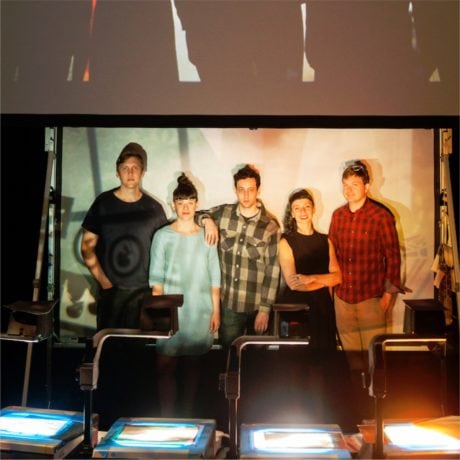Manual Cinema: The End of TV proved to be an interesting last night for the Columbia Festival of the Arts for this year. It was presented at the Smith Theatre at the Horowitz Center at Howard Community College. The company is out of Chicago and used live music and silhouette imagery and employed very clever cut-out puppets and scenery, vintage overhead projectors and live-feed cameras to tell their story.

If it sounds complicated, it was. The real marvel of this show was how well coordinated the puppeteers/actors were as they not only changed characters, interfaced with projected images and developed three-dimensional people that made us care, but handled all the projection changes and silhouette puppets without missing a beat. Much of the action was done by miming, only the TV had a voice. This was all blended with live music from a 5-piece orchestra and with musicians also supplying the vocals to match the story being told.
The story was fairly simple but compelling. It followed two Detroit women, one a senior dealing with periods of dementia. Flo, and the other, Louise, a factory worker who lost her factory job. Their lives came together when the recently unemployed woman got a job delivering Meals on Wheels. Both impacted each other’s lives, and the end was both sad and uplifting. The underlying theme, dealt with how TV has, especially in the later part of the last century, woven itself into our lives. The older woman was addicted to shopping on QVC and the Jolly Green Giant morphed into a godlike being in her mind. TV had become her reality. Flo used her new found free time to begin a garden which became a symbol of rebirth not only for her but her community as well. Another character, Ann, was the QVC-style host who was involved with finding happiness via a pseudo-spiritual infomercial.
Manual Cinema created a very innovative production. It worked best is when it focused on the characters of Flo and Louise. The chemistry between the two characters was moving and seemed very realistic. However, it was sometimes very visually confusing as there are two screens projected to the audience simultaneously showing the puppet shadows and live action.
The orchestra also was in view and took up about a third of the stage. The visual confusion diminished as the plot developed, but my eyes were constantly attracted to the bright lights of the projectors, and the live action. When I focused on the larger silhouette only screen, I found the production to be more visually appealing. However, this could be my own personal preference.
This should not keep you from seeing a Manual Cinema production. Innovative theater can often be a rewarding experience. I was moved, they conveyed an important message and did it in a very unique style. I would go to another Manual Cinema production. It was well worth seeing this blend of new and old techniques.
The puppeteers/actors who undertook this tremendous production with much agility and talent included Jeffrey Paschal, Kara Davidson, and Aniesa Hicks under the direction of Julia Miller. The moving music that played throughout was by Kyle Vegter and Ben Kauffman and the orchestra who played the score captured the sentiment while never being obtrusive. They included Deidre Huckabay on flute, Ben Kauffman on keyboard, guitar and vocals, Maren Celest, vocals sound design, and live video editing, Marques Toliver, on violin and vocals and Lia Kohl on cello and vocals.
This is an internationally renowned group and for those who love experimental theater, Manual Cinema is a must if they are every in your area.
If you missed the Columbia Festival of the Arts this June they will be back next year. They are always a special event not only for Columbians but for visitors from all over.
Manual Cinema: The End of TV played for one night only on Saturday, June 24, 2017, at the Columbia Festival of the Arts at Smith Theatre, Horowitz Center at Howard Community College – 10901 Little Patuxent Parkway, in Columbia, MD. For tickets to future events, go online.
Note: Every year the Festival presents a series of movies from the Sprout Film Festival. These are short films about and starring special needs individuals of all ages. I found it very positive but touching emotional experience and want to encourage you to view them on their website or if you can see them in person.





